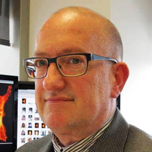Lessons from the embryo: how physical mechanics shape and guide tissue self-assembly

February 12, 2021 1:00-2:00 p.m.
Lance Davidson, MSc, PhD
William Kepler Whiteford Professor
BioEngineering, Dev Biology, Comp. and Systems Biology
University of Pittsburgh
ABSTRACT: Watch any time-lapse of developing embryos and you will be astounded by the choreography of these self-organizing systems. Tissues coordinate their motion to generate all the multicellular life forms that surround us. These motions do not only generate robust geometric forms but are key to the physiological operation of the organism. The past 20 years have seen a resurgent interest in the role of physical mechanics that drive these movements. More recently, our group and others have been leveraging this knowledge to investigate the role that mechanical ‘information’ plays during development, guiding cell fate choices as well as cell behaviors. In this talk I will outline fundamental advances in biomechanics of embryonic development and then show how we are using these tools and insights to explore the mechanobiology of early development and how embryos rely on mechanical patterns to drive differentiation. I will conclude by discussing how newly exposed principles of embryonic self-assembly are leading to new insights and technologies for tissue engineering.
BIOGRAPHY: Lance Davidson is the William Kepler Whiteford Professor of Bioengineering at the University of Pittsburgh where he is the director of the Mechanics of Morphogenesis Laboratory. He received a BS degree in Physics from the University of Illinois at Urbana-Champaign and a MSc degree in Experimental Space Science at York University in Toronto, Canada. He earned his PhD in Biophysics at the University of California-Berkeley working with Mimi Koehl and George Oster. He completed a postdoctoral fellowship at the University of Virginia in Cell and Developmental Biology.
The Mechanics of Morphogenesis Lab at the University of Pittsburgh seeks to understand how tissues and organs are shaped in the embryo and how principles of self-assembly can be applied to engineer tissues. Our experimental and theoretical approaches are multiscale, ranging from super-resolution imaging and simulation of intracellular effectors to mesoscale analysis of bulk movements and biomechanics. Such multiscale analysis is uncovering feedback circuits that make tissue assembly more robust even as structures become more complex.




